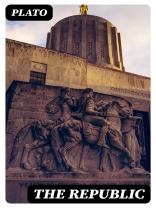Plato’s 'The Republic’ stands as a cornerstone of Western philosophy, exploring themes of justice, politics, and the ideal state through a dialectical dialogue primarily between Socrates and various interlocutors. Employing a blend of philosophical inquiry and literary artistry, Plato navigates through complex arguments on the nature of justice, the construction of an ideal society, and the role of the philosopher-king. With its rich allegorical content, particularly the allegory of the cave, 'The Republic’ critiques contemporary Athenian society while presenting a visionary blueprint for achieving a harmonious and just community. Plato, a student of Socrates and a teacher of Aristotle, wrote 'The Republic’ during a time of political upheaval in ancient Greece, particularly after the fall of Athenian democracy. His formative experiences with Socratic dialogues profoundly shaped his philosophical approach, leading him to ponder the implications of governance, morality, and human knowledge. By establishing the Academy and advancing his philosophical treatises, Plato sought to influence future generations in envisioning a society grounded in philosophical wisdom. This essential text is highly recommended for readers seeking a deep understanding of philosophical thought and its application to political theory. 'The Republic’ resonates with contemporary issues of governance and ethics, making it not merely an ancient treatise but a living text that continues to inspire discussions on justice and the moral fabric of society.
O autorze
Plato (circa 427-347 BCE) stands as an emblematic figure in the landscape of Western philosophy. A student of Socrates and a mentor to Aristotle, Plato’s contributions laid foundational stones for Western political theory, metaphysics, epistemology, and ethics. Born into an aristocratic Athenian family, he was expected to pursue a career in politics; however, the execution of Socrates in 399 BCE profoundly affected Plato and steered him toward a life of contemplation and philosophy. Plato established the Academy in Athens, an institution often described as the first Western university, and where he taught until his death.
One of Plato’s most renowned works is 'The Republic, ’ an extensive dialogue contemplating the meaning of justice and examining the constitution of an ideal state. Within this seminal text, Plato introduces his allegory of the cave, which explores the nature of truth and the process of enlightenment. 'The Republic’ articulates a philosopher-king concept where a righteous and wise ruler, informed by transcendent insight, is the ideal leader of a just society. Plato’s eloquent dialectic style championed exposition through structured conversation, a hallmark of many of his other dialogues, such as 'Phaedo, ’ 'Symposium, ’ and 'Timaeus.’ Through his literary corpus, Plato’s work continues to be a cornerstone of philosophical education and intellectual discourse centuries after his demise.












